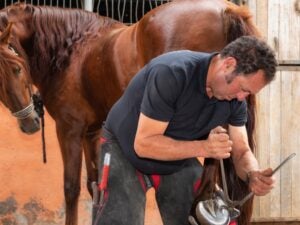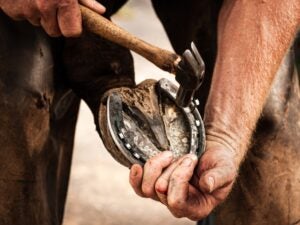Most of us have heard the saying, “No hoof, no horse,” and while part of hoof health comes down to good genetics, much of the rest comes down to hoof care offered through a farrier.
If you trim or shoe your own horses, then getting the work done comes down to your skill and willingness to get out there and do the work.
However, for those that choose to use professional craftsmen to trim and shoe their horse’s feet, there’s probably been a time when you or someone else has been frustrated with finding a good one, getting them to show up on time, and making sure their skills line up with your horse’s needs.

There’s a flip side to that coin, though, so we asked some professionals what they wish their clients knew. Here’s what they said:
1. It’s a dangerous profession
Becoming a skilled farrier takes an extraordinary amount of time and energy, and skilled workers can make difficult work look easy. It’s hard work physically, mentally, and emotionally.
“We wish they knew that every time we work on their horse at any point, our entire career or life could be ended,” said one farrier.
2. It’s business, and scheduling matters
“We spend a lot of time prepping for appointments and have other appointments before and after yours. Time is precious, and being prepped and ready for us when we get there is extraordinarily helpful when we have long, hard days,” says another horseshoer.
3. Hire someone who meets your needs
Do research on your farrier, find out what their qualifications are, and what they mean. Get references. That way, you can build a relationship of trust and understand the level of their work.
4. Horseshoeing and horsemanship is a lifelong journey
Have the mindset that horsemanship and horseshoeing are lifelong journeys. Just when you think you know it all is when you don’t.
5. Beware the fad
Things that you read about on the internet are most likely fads. Ask your farrier about them instead of telling them it’s what your horse needs.

6. Train your horses
Don’t make excuses for your horse’s behavior. If your horse is acting like a spoiled brat throwing a fit in the candy aisle, it’s time to look inside yourself and the time you’ve put into preparing your animal for success.
7. Farriers are professionals
A farrier is a professional like your dentist or your vet. They specialize in the horse’s hoof, and they, more often than not, are specialists in this area.
8. Diet is going to impact the hoof
Quit feeding your horses too much. Overfeeding can lead to laminitis and a generally poor quality of life in your horses.
9. Payment is due at the time of service
You wouldn’t call a plumber or electrician to work on your house and ask them to hold payment. Your farrier isn’t your bank — pay them on time.
10. Plan, and keep to schedule
The sign of a good farrier is a busy one. “We aren’t waiting for your call,” said one farrier. “Your poor planning doesn’t constitute an emergency on our part.”


